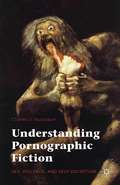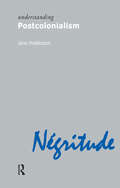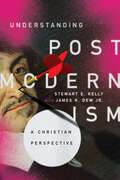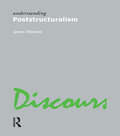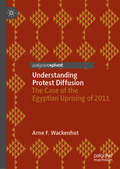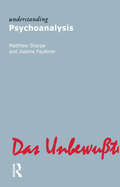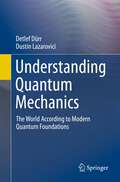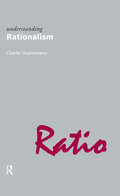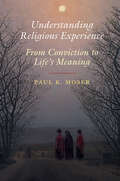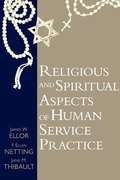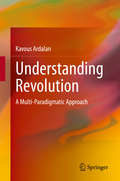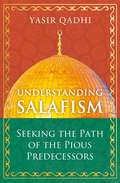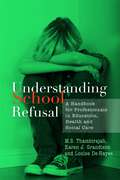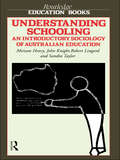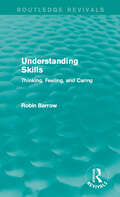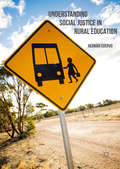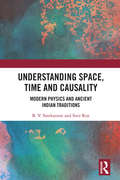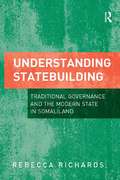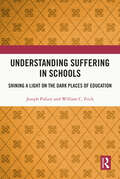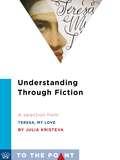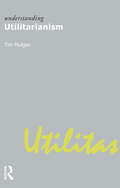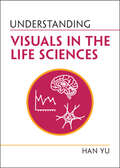- Table View
- List View
Understanding Pornographic Fiction: Sex, Violence, and Self-Deception
by Charles NussbaumThis work defends two main theses. First, modern Western pornographic fiction functions as a self-deceptive vehicle for sexual or blood-lustful arousal; and second, that its emergence owes as much to Puritan Protestantism and its inner- or this-worldly asceticism as does the emergence of modern rationalized capitalism.
Understanding Postcolonialism (Understanding Movements In Modern Thought Ser.)
by Jane HiddlestonPostcolonialism offers challenging and provocative ways of thinking about colonial and neocolonial power, about self and other, and about the discourses that perpetuate postcolonial inequality and violence. Much of the seminal work in postcolonialism has been shaped by currents in philosophy, notably Marxism and ethics. "Understanding Postcolonialism" examines the philosophy of postcolonialism in order to reveal the often conflicting systems of thought which underpin it. In so doing, the book presents a reappraisal of the major postcolonial thinkers of the twentieth century.Ranging beyond the narrow selection of theorists to which the field is often restricted, the book explores the work of Fanon and Sartre, Gandhi, Nandy, and the Subaltern Studies Group, Foucault and Said, Derrida and Bhabha, Khatibi and Glissant, and Spivak, Mbembe and Mudimbe. A clear and accessible introduction to the subject, "Understanding Postcolonialism" reveals how, almost half a century after decolonisation, the complex relation between politics and ethics continues to shape postcolonial thought.
Understanding Postmodernism: A Christian Perspective
by James K. Dew Jr.Postmodernity has matured. But the challenge of navigating our contemporary culture remains. In order for Christians to make wise decisions, we first need to understand the many facets of our postmodern context. If René Descartes is often identified as the first truly modern philosopher in light of his confidence in human reason, then postmodernism has taken Descartes to the woodshed. Stewart Kelly and James Dew detail the litany of concerns that postmodernism has raised: overconfidence in human reason, the limitations of language, the relativity of truth, the lack of a truly objective view, the inherently oppressive nature of metanarratives, the instability of the human self, and the absence any moral superiority. With wisdom and care, Kelly and Dew compare these postmodern principles with the gospel of Jesus Christ and the Christian faith. What emerges is neither a rejection of everything postmodernism is concerned with nor a wholesale embrace of all that it affirms. Instead, we are encouraged to understand the postmodern world as we seek to mature spiritually in Christ.
Understanding Poststructuralism (Understanding Movements In Modern Thought Ser.)
by James WilliamsUnderstanding Poststructuralism presents a lucid guide to some of the most exciting and controversial ideas in contemporary thought. This is the first introduction to poststructuralism through its major theorists - Derrida, Deleuze, Foucault, Lyotard, Kristeva - and their central texts. Each chapter takes the reader through a key text, providing detailed summaries of the main points of each and a critical and detailed analysis of their central arguments. Ideas are clearly explained in terms of their value to both critical thinking and to contemporary issues. Criticisms of poststructuralism are also assessed. The aim throughout is to illuminate the main methods of poststructuralism - deconstruction, libidinal economics, genealogy and transcendental empiricism - in context. A balanced and up-to-date assessment of poststructuralism, the book presents the ideal introduction to this most revolutionary of philosophies.
Understanding Protest Diffusion: The Case of the Egyptian Uprising of 2011
by Arne F. WackenhutThis book traces the mobilization process leading up to the January 25 Uprising, and furthers our understanding of the largely unexpected diffusion of protest during this Egyptian Revolution. Focusing on the role of the so-called “Cairo-based political opposition,” this study strongly suggests a need to pay closer attention to the complexity and contingent nature of such large-scale protest episodes. Building on interviews with activists, employees of NGOs in the human rights advocacy sector, and journalists, this in-depth single case study reveals how different movement organizations in the Egyptian prodemocracy movement had long, and largely unsuccessfully, tried to mobilize support for socio-political change in the country. Against this backdrop, the book illustrates how a coalition of activists sought to organize a protest event against police brutality in early 2011. The resulting protests on January 25 surprised not only the regime of Hosni Mubarak, but also the organizers.
Understanding Psychoanalysis (Understanding Movements In Modern Thought Ser.)
by Matthew Sharpe Joanne Faulkner"Understanding Psychoanalysis" presents a broad introduction to the key concepts and developments in psychoanalysis and its impact on modern thought. Charting pivotal moments in the theorization and reception of psychoanalysis, the book provides a comprehensive account of the concerns and development of Freud's work, as well as his most prominent successors, Melanie Klein and Jacques Lacan.The work of these leading psychoanalytic theorists has greatly influenced thinking across other disciplines, notably feminism, film studies, poststructuralism, social and cultural theory, the philosophy of science and the emerging discipline of neuropsychoanalysis. Analysing this engagement with other disciplines and their key theorists, "Understanding Psychoanalysis" argues for a reconsideration of psychoanalysis as a resource for philosophy, science, and cultural studies.
Understanding Quantum Mechanics: The World According to Modern Quantum Foundations
by Detlef Dürr Dustin LazaroviciThis book discusses the physical and mathematical foundations of modern quantum mechanics and three realistic quantum theories that John Stuart Bell called "theories without observers" because they do not merely speak about measurements but develop an objective picture of the physical world. These are Bohmian mechanics, the GRW collapse theory, and the Many Worlds theory. The book is ideal to accompany or supplement a lecture course on quantum mechanics, but also suited for self-study, particularly for those who have completed such a course but are left puzzled by the question: "What does the mathematical formalism, which I have so laboriously learned and applied, actually tell us about nature?”
Understanding Rationalism (Understanding Movements In Modern Thought Ser.)
by Charlie HuenemannThe three great historical philosophers most often associated with rationalism - Descartes, Spinoza and Leibniz - opened up ingenious and breathtaking vistas upon the world. Yet their works are so difficult that readers often find themselves stymied. "Understanding Rationalism" offers a guide for anyone approaching these thinkers for the first time.With clear explanations, elegant examples and insightful summaries, "Understanding Rationalism" unlocks their intricate metaphysical systems, which are by turns surprising, compelling and sometimes bizarre. It also lays out their controversial stances on moral, political and religious problems. The study is framed by an opening discussion of the broad themes and attitudes common to these three philosophers and a closing analysis of the legacy they left for the rest of philosophy.
Understanding Religious Experience: From Conviction to Life's Meaning
by Paul K. MoserIn this book, Paul K. Moser offers a new approach to religious experience and the kind of evidence it provides. Here, he explains the nature of theistic and non-theistic experience in relation to the meaning of human life and its underlying evidence, with special attention given to the perspectives of Tolstoy, Buddha, Confucius, Krishna, Moses, the apostle Paul, and Muhammad. Among the many topics explored in this timely volume are: religious experience characterized in a unifying conception; religious experience naturalized relative to science; religious experience psychologized in merely psychological phenomena; and religious experience cognized relative to potential defeaters from evil, divine hiddenness, and religious diversity. Understanding Religious Experience will benefit those interested in the nature of religion and can be used in relevant courses in religious studies, philosophy, theology, Biblical studies, and the history of religion.
Understanding Religious and Spiritual Aspects of Human Service Practice
by F. Ellen Netting James Ellor Jane M. ThibaultContending that despite current efforts to make social workers sensitive to differences of race, ethnicity, and gender, the diversity and impact of religious beliefs has often been overlooked, three professors of social work/human services offer a guide to direct practice concerns. Spiritual assessment, positive and pathological uses of religious practice, and the need for spiritual self-awareness among human-service workers are explored, as are issues related to community, congregation, and making of public policy. Annotation c. Book News, Inc., Portland, OR (booknews.com)
Understanding Revolution: A Multi-Paradigmatic Approach
by Kavous ArdalanThis book applies a multiparadigmatic philosophical frame of analysis to the topic of social revolution. Crossing two disciplines and lines of literature—social philosophy and social revolution—this book considers different aspects of social revolution and discusses each aspect from four diverse paradigmatic viewpoints: functionalist, interpretive, radical humanist, and radical structuralist. The four paradigms are founded upon different assumptions about the nature of social science and the nature of society. Each paradigm generates theories, concepts, and analytical tools that are different from those of other paradigms. An understanding of different paradigms leads to a more balanced understanding of the multi-faceted nature of the subject matter.In this book, the first chapter reviews the four paradigms. Using the Iranian Revolution as exemplar, the next few chapters provide paradigmatic explanations for a particular aspect of revolution: culture, religion, ideology. With this background, the book introduces a comprehensive approach to the understanding of revolution. The final chapter concludes by recommending further paradigmatic diversity. This book will be of particular interest to students and researchers interested in social revolution, political sociology, and political theory.
Understanding Salafism: Seeking the Path of the Pious Predecessors
by Yasir QadhiA comprehensive overview of the most misunderstood movement in modern Islam: Salafism.The Salafi movement invokes fear and dread in outsiders who treat Salafism as synonymous with religious extremism. For Salafis themselves, it&’s a jealously guarded title, always in danger of dilution. Salafism has changed the face of Islam; its ideas reach far outside its own ranks. Yet popular portrayals never go beyond hackneyed stereotypes. In Understanding Salafism, Dr Yasir Qadhi delves into the origins of the movement, from the earliest debates in Islam to Salafism today, in both the Western and Islamic worlds. In an analysis covering Salafism in the Middle East, Europe, the United States and Africa, he illuminates Salafism&’s theological ideas, the debates within Salafism about political participation, and its relationship to other schools in Sunni Islam.----- Yasir Qadhi is a resident scholar of the East Plano Islamic Center in Texas, and dean of the Islamic Seminary of America. He is one of the few people who has combined a traditional Eastern Islamic seminary education with Western academic training in the study of Islam. ----- Table of ContentsList of Figures Preface Conventions 1 Introduction: A Bird&’s Eye View of Salafism 2 A Comprehensive History of Salafi Thought: From its Origins to Modernity 3 Wahhabism and Salafism 4 Salafism and Islamism: A Case Study of the Muslim Brotherhood 5 The Phenomenon of Jihadi-Salafism 6 Global Salafism in the Contemporary World Epilogue Notes Bibliography Index
Understanding School Refusal: A Handbook for Professionals in Education, Health and Social Care
by M. S. Thambirajah Karen J. Grandison Louise De-Hayes` Combining educational and clinical perspectives, and with extensive use of case studies, the authors present recent research into the mental health problems associated with school refusal, such as anxiety and panic attacks, as well as the role that parental support plays in their children's school life. They also discuss the role of home tuition services and pupil referral units in extreme cases of school refusal, and provides concrete strategies for planning and organising services to manage the problem effectively. Understanding School Refusal is a valuable guide for professionals across the disciplines of education, health and social care, and will also be useful for training courses within these fields.' Education Today School refusal is a crippling condition in which children experience extreme anxiety or panic attacks when faced with everyday school life and this handbook aims to explore and raise awareness of the problem of school refusal in children and young people, and provide plans and strategies for education, health and social care professionals for identifying and addressing this problem. Combining educational and clinical perspectives, and with extensive use of case studies, the authors present recent research into the mental health problems associated with school refusal, such as anxiety and panic attacks, as well as the role that parental support plays in their children's school life. They also discuss the role of home tuition services and pupil referral units in extreme cases of school refusal, and provides concrete strategies for planning and organising services to manage the problem effectively. Understanding School Refusal is a valuable guide for professionals across the disciplines of education, health and social care, and will also be useful for training courses within these fields.
Understanding Schooling: An Introductory Sociology of Australian Education
by Sandra Taylor John Knight Robert Lingard Miriam HenryFirst published in 1990. Routledge is an imprint of Taylor & Francis, an informa company.
Understanding Skills: Thinking, Feeling, and Caring (Routledge Revivals)
by Robin BarrowIt is widely agreed that education should involve the development of understanding, critical thinking, imagination, and emotions. However, this book, first published in 1990, argues that our views to these key concepts are confused and inaccurate, and therefore what we do in schools is generally inappropriate to our ideal. This book will be of interest to students of education and philosophy.
Understanding Social Justice in Rural Education
by Hernán CuervoThis book explores what social justice looks like for rural schools in Australia. The author challenges the consensus that sees the distribution of resources as the panacea for the myriad challenges faced by rural schools and argues that the solution to inequality and injustice in rural settings has to take into account other important dimensions of social justice such as recognition and association. These include teachers' concerns for issues of power, respect, and participation in their work that extend to policy-making processes and implementation; students' post-school aspirations and, finally, parents' hopes and fears for their children's futures and the sustainability of their community. The book brings together political and social theory with education and youth studies, provides new insights about the complex nature of schooling in rural places, and makes a strong connection between schooling and the people and communities it serves.
Understanding Space, Time and Causality: Modern Physics and Ancient Indian Traditions
by Sisir Roy B.V. SreekantanThis book examines issues related to the concepts of space, time and causality in the context of modern physics and ancient Indian traditions. It looks at the similarity and convergence of these concepts of modern physics with those discussed in ancient Indian wisdom. The volume brings the methodologies of empiricism and introspection together to highlight the synergy between these two strands. It discusses wide-ranging themes including the quantum vacuum as ultimate reality, quantum entanglement and metaphysics of relations, identity and individuality, and dark energy and anti-matter as discussed in physics and in Indian philosophical schools like Vedanta, Yoga, Buddhist, Kashmiri Shaivism and Jaina Philosophy. First of its kind, this book will be an essential read for scholars and researches of philosophy, Indian philosophy, philosophy of science, theoretical physics and social science.
Understanding Statebuilding: Traditional Governance and the Modern State in Somaliland
by Rebecca RichardsMuch analysis of state building focusses on dissecting specific projects and attempting to identify what has gone ’wrong’ in states such as Afghanistan and Iraq. What draws less attention is what has gone ’right’ in non-interventionist statebuilding projects within 'unrecognised’ states. By examining this model in more depth a more successful model of statebuilding emerges in which the end goal of modern democracy and good governance are more likely to be realized. Indeed 'states-within-states’ such as Somaliland where external intervention in the statebuilding process is largely absent can provide vital new lessons. Somaliland is a functioning democratic political entity in northwestern Somalia which declared its independence from the troubled south in 1991 and then embarked on an ambitious project to create a democratic government and successful state in the post-conflict environment. The leaders and the people of Somaliland have since succeeded not only in maintaining peace and stability, but also in building the institutions of government and the foundations for democracy that have led to a succession of elections, peaceful transfers of power and a consolidation of democratization. The resulting state of Somaliland is widely hailed as a beacon of success within a politically turbulent region and provides a useful framework for successful statebuilding projects throughout the world.
Understanding Stuart Hall
by Helen Davis'This is the most lucid and engaged account of Stuart Hall's work. Meticulously, and with an exemplary generosity, Helen Davis patiently unravels the threads of Hall's intellectual history. The result is a most useful and thoughtful book, which could prove to be indispensable for students of cultural studies' - Graeme Turner, University of Queensland Understanding Stuart Hall traces the development of one of the most influential and respected figures within cultural studies. Focusing on Stuart Hall's writings over a period of nearly fifty years, this volume offers students and academics a cogent and exploratory route through complex and overlapping areas of analysis. In her critical assessment of Hall's most important contributions to academic and public debate, Davis shows the extent to which his analyses of race and ethnicity have been informed by early studies of Marxism, class and 'societies structured in dominance'. Davis offers fresh insight into the formation of one of the most prolific, charismatic and controversial intellectuals of his generation. Despite having been branded a 'cultural pessimist', Stuart Hall has long been associated with encouraging new, cutting-edge scholarship within the field. This volume concludes with a discussion of Hall's most recent political and academic interventions and his continuing commitment to innovation within the visual arts.
Understanding Suffering in Schools: Shining a Light on the Dark Places of Education
by William C. Frick Joseph PolizziDrawing inspiration from Dr. Willi Schohaus’s classic text The Dark Places of Education, this book contributes to the discussion by defining suffering in schools and providing a survey of the American school system’s inadequacies in the early twenty-first century. Through testimonies from former students on the ways they experienced suffering in school, this volume demonstrates how suffering can profoundly affect one’s academic growth and development—or worse. By analyzing the findings within a multidisciplinary ethical and educational framework, this volume presents a moral vision for understanding the role that suffering plays in school. Drawing on research in medicine, psychology, social sciences, religion, and education, this text weaves together many strands of thinking about suffering. This book is essential reading for academics, researchers, and postgraduate students in the fields of educational leadership, foundations of education, and those interested in both the history of education and critical contemporary accounts of schooling.
Understanding Terrorism in America (Extremism and Democracy)
by Christopher HewittChristopher Hewitt's comprehensive book surveys the characteristics and causes of terrorism and governmental responses to it. He also examines the organizational structure of terrorist networks, how they are financed and their ideological agendas. Groups covered include: Islamic fundamentalists, white and black racists, black nationalists, revolutionary communists, neo-Nazis, militant Jewish groups, anti-abortionists and émigré groups. This book is essential reading for students of American politics and terrorism. It also provides a highly readable account for interested readers wishing to know more about a topic which has recently become tragically relevant to world affairs.
Understanding Through Fiction: A Selection from Teresa, My Love: An Imagined Life of the Saint of Avila (To the Point)
by Julia KristevaBorn in 1515, Teresa of Avila survived the Spanish Inquisition and was a key reformer of the Carmelite Order. Her experience of ecstasy, which she intimately described in her writings, released her from her body and led to a complete realization of her consciousness, a state Julia Kristeva explores as it was expressed in Teresa's writing. Incorporating notes from her own psychoanalytic practice, as well as literary and philosophical references, Kristeva builds a fascinating dual diagnosis of contemporary society and the individual psyche while sharing unprecedented insights into her own character. Through her dazzlingly varied formats Kristeva tests the borderlines of atheism and the need for faith, feminism and the need for a benign patriarchy.
Understanding Utilitarianism (Understanding Movements In Modern Thought Ser.)
by Tim MulganUtilitarianism - a philosophy based on the principle of the greatest happiness for the greatest number of people - has been hugely influential over the past two centuries. Beyond ethics or morality, utilitarian assumptions and arguments abound in modern economic and political life, especially in public policy. An understanding of utilitarianism is indeed essential to any understanding of contemporary society. "Understanding Utilitarianism" presents utilitarianism very much as a living tradition. The book begins with a summary of the classical utilitarianism of the eighteenth and nineteenth centuries. Subsequent chapters trace the development of the central themes of utilitarian thought over the twentieth century, covering such questions as: What is happiness? Is happiness the only valuable thing? Is utilitarianism about acts or rules or institutions? Is utilitarianism unjust, or implausibly demanding, or impractical? and Where might utilitarianism go in the future?
Understanding Virtue Ethics (Understanding Movements in Modern Thought)
by Stan van HooftMore and more philosophers have advocated varieties of virtue-based ethics that challenge moral theory traditionally founded on moral obligation and the delineation of what is right or wrong in given situations. Virtue ethics, which focuses upon the character of moral agents more than on the moral status of their actions or the consequences of those actions, has become one of the most important and stimulating areas of contemporary ethical theory. "Understanding Virtue Ethics" is an accessible and lively introduction to the subject. It provides a broad overview of the history of virtue ethics from Aristotle to Nietzsche as well as examining the ideas of such contemporary writers as Ricoeur and Levinas. Major themes dealt with by moral theory are examined and how a virtue ethics approach to them differs from those of other traditions is explored. Practical problems of moral complexity such as abortion, euthanasia, and integrity in politics, and how they might be approached from a virtue perspective are considered. The charges of relativism and egoism that are often mounted against virtue ethics are rebutted and virtues that are especially relevant to contemporary life, namely, courage, taking responsibility, and reverence are examined in depth. Finally, the author argues that virtue ethics is highly relevant to our understanding of the moral dimensions of professional roles.
Understanding Visuals in the Life Sciences (Understanding Life)
by Han YuFrom photographs to micrographs, from the various types of graphs to fun, interactive visuals and games, there are many different forms in which science can be visualised. However, all of these forms of visualisation in the Life Sciences are susceptible to misunderstandings and misinformation. This accessible and concise book demonstrates the misconceptions surrounding the visuals used in popular life science communication. Richly illustrated in colour, this guide is packed with examples of commonly used visual types: photographs, micrographs, illustrations, graphs, interactive visuals, and infographics allowing visual creators to produce more effective visuals that aspire to being both attractive and informative for their target audience. It also encourages non-specialist readers to be more empowered and critical, to ask difficult questions, and to cultivate true engagement with science. This book is an invaluable resource for life scientists and science communicators, and anyone who creates visuals for public or non-specialist readers.
